
MOSCOW/NEW YORK – In a remarkable turn of events, the Russian Ruble has emerged as the world's best-performing currency in 2025, surging over 40% year-to-date. This unexpected rally defies the ongoing war in Ukraine, a significant drop in oil prices, stringent Western sanctions, and a looming economic slowdown, reversing two years of steep declines and captivating global markets.
Economists and analysts largely attribute the Ruble's strength not to a renewed confidence from foreign investors but rather to the stringent capital controls and tight monetary policies implemented by the Russian authorities. The broad-based weakening of the US Dollar this year has also provided an additional tailwind.
Brendan McKenna, an economist and FX strategist at Wells Fargo, highlighted the multifaceted factors at play in an interview with CNBC. "The Ruble's appreciation is a complex interplay of aggressive interest rate hikes by the Russian Central Bank, enhanced capital controls and foreign exchange regulations, and attempts at progress in peace negotiations between Russia and Ukraine," McKenna explained.
The Russian Central Bank (CBR) has maintained its benchmark interest rate at a high 21% to combat elevated inflation. Industry insiders suggest that these high borrowing costs have significantly dampened import activities by Russian businesses, consequently reducing the demand for foreign currency. Andrey Melashenko, an economist at Renaissance Capital, noted, "With subdued consumption and an ample supply of Rubles, the demand for foreign currency from Russian importers is decreasing." This reduced demand for foreign currency means banks have less need to sell Rubles to acquire Dollars or Chinese Yuan, positively impacting the Ruble's value.
Furthermore, Russian exporters are now mandated to receive export payments in Rubles, or convert their Dollar earnings into Rubles, thereby increasing Ruble demand. Conversely, importers have cut back on purchases of foreign goods, lessening their need to exchange Rubles for Dollars.
Another critical factor driving the Ruble's strength this year, according to experts, is the mandatory conversion of foreign currency earnings into Rubles by Russian exporters, particularly from the vital oil industry. The Russian government has obligated large exporters to repatriate a certain portion of their foreign currency revenues and convert them into Rubles in the domestic market. According to the CBR, major Russian exporters sold a total of $42.5 billion in foreign currency from January to April this year, an increase of approximately 6% compared to the previous four months.
Steve Hanke, a Professor of Applied Economics at Johns Hopkins University, also pointed to the central bank's contraction of the money supply as a contributing factor to the Ruble's appreciation. "In August 2023, the CBR's money supply growth rate was an annual 23.9%, but it has since shifted to a contraction of -1.19% since January this year," Hanke detailed.
McKenna of Wells Fargo further added that "some optimism has emerged in the market, fueled by increasing expectations for peace negotiations between Ukraine and Russia following the election of President Donald Trump." He elaborated, "Despite capital control measures, the expectation of Russia's reintegration into the international community has encouraged capital inflows into Ruble-denominated assets, providing some support for the currency's strength."
Despite the current strength, experts caution that the Ruble's recent surge may not be sustainable. A significant drop in oil prices this year, a core pillar of Russia's export economy, could strain foreign currency inflows. Melashenko of Renaissance Capital predicts, "The Ruble is currently close to its peak and could soon reverse course to weaken." He explained, "With oil prices significantly lower, it is highly probable that this will lead to a decrease in export revenues and a reduction in foreign currency selling."
There are also concerns that even if the largely unproductive peace negotiations between Russia and Ukraine find a resolution, it might not trigger further Ruble appreciation. McKenna of Wells Fargo analyzed that "a substantive peace agreement could lead to the lifting of foreign exchange regulations and other controls that have been key drivers of the Ruble's strength, potentially causing the Ruble's value to weaken." He added, "Should a ceasefire or peace agreement materialize, the Ruble could depreciate rapidly, simultaneously with the complete lifting of capital controls and the central bank's swift lowering of benchmark interest rates."
[Copyright (c) Global Economic Times. All Rights Reserved.]




























